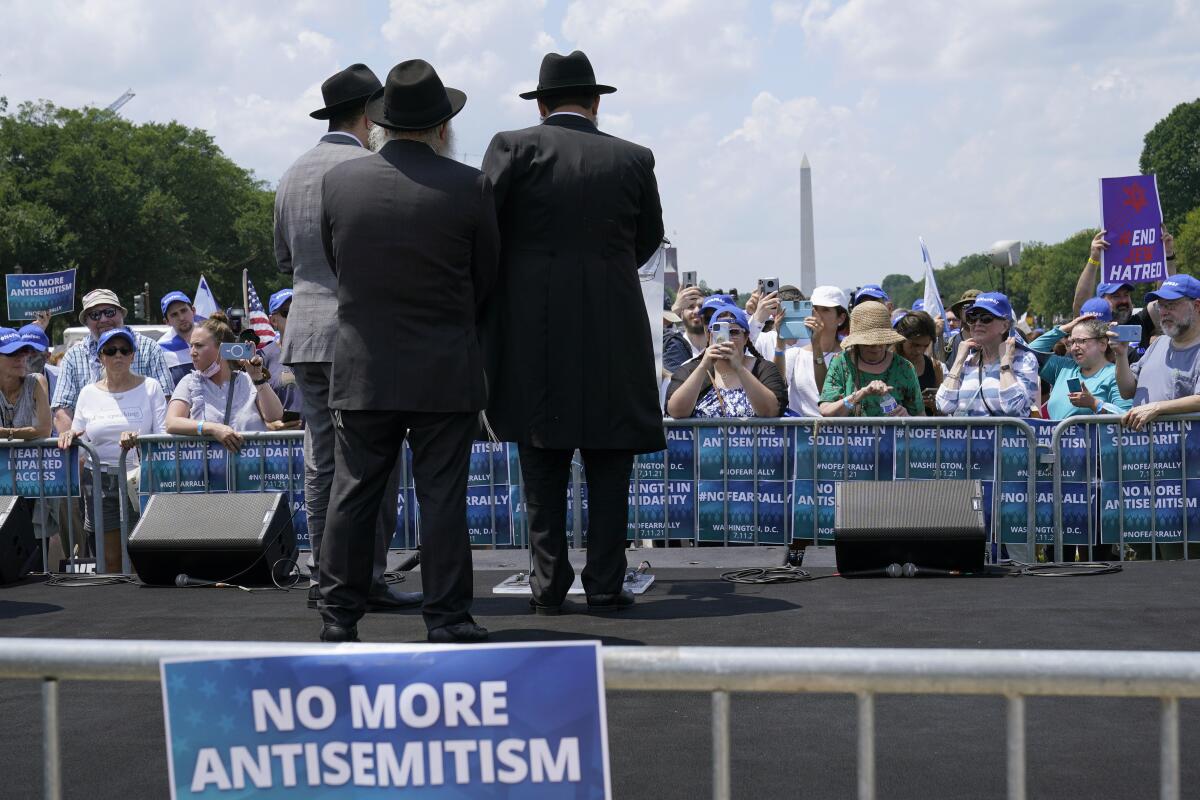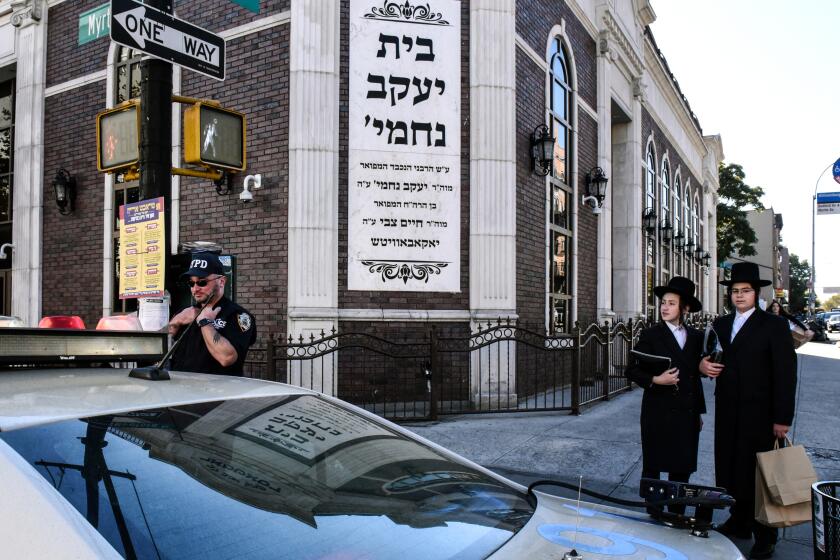Antisemitism and safety fears surge among U.S. Jews, survey finds

Nearly two-thirds of American Jews feel less secure in the U.S. than they did a year ago, according to a new national survey.
The American Jewish Committee, a prominent advocacy organization, conducted the survey last fall just as the Israel-Hamas war began on Oct. 7. The number of American Jews who say they feel less secure in the U.S. jumped 22% from last year’s survey.
“This year’s study shows us very clearly that antisemitism that was really just a simmering flame is now, especially since Oct. 7, a five-alarm fire,” said Ted Deutch, chief executive of the American Jewish Committee.
The survey released Tuesday found one quarter of American Jews said they have been the target of antisemitism in the past year. Almost half of American Jews responding to the survey said they had altered their behavior during the past year to avoid antisemitism — changing what they wore, what they posted online or where they went so other people wouldn’t know they were Jewish.
“I live in a rural area and my home is most likely the only Jewish home in a 30-mile radius,” a 62-year-old woman is quoted as saying in the survey report. “We don’t tell people and outside the home do not show that we are Jewish.”
Even before the Gaza war, antisemitism was on the rise. That has deeply unsettled many American Jews, accustomed to seeing the U.S. as a safe haven.
That reticence is “an enormous challenge for the Jewish community,” Deutch said. “But it really represents a challenge for all of our society.”
The survey comes as Jewish and Muslim civil rights and advocacy groups have reported large increases in harassment, bias and physical attacks against their members in the wake of the Israel-Hamas war.
Brian Levin, founding director of the Center for the Study of Hate and Extremism at Cal State San Bernardino, said he has seen a surge in anti-Jewish and Islamophobic internet searches since last fall, including “eliminationist” and homicidal language.
Levin, who is not affiliated with the American Jewish Committee survey, said anti-Jewish hate crimes hit a record high last year in several major cities. “As Jews are understandably feeling more insecure, police and social science data back up why,” he said.
The AJC began its survey five years ago, after the Tree of Life synagogue massacre in Pittsburgh, the deadliest antisemitic attack on American soil. Since then, most Jews and more than half of Americans say they think antisemitism has increased, according to the AJC.
This year’s primary survey collected data from 1,528 Jewish adults in the U.S., while its companion survey collected data from 1,223 U.S. adults. The surveys, conducted by the polling firm SSRS, had margins of error of 3.5% and 3.6% respectively.
Jews between 18 and 29 were more likely to report being a target of antisemitism. As universities grapple with antisemitism, around a quarter of Jewish college students or recent graduates reported hiding their Jewish identity or refraining from speaking about Israel on campus.
Most American Jews — 85% — say the statement “Israel has no right to exist” is antisemitic. A 52-year-old male respondent is cited in the report as saying, “Criticizing Israel’s political policies (ex: treatment of non-Jews in the country, Palestinians for example) is not antisemitic. Saying that Israel should not exist, as a result of these practices, IS antisemitic.”
Most Americans who witnessed antisemitism saw it online or on social media, but only 5% said they reported it. More than one in five American Jews said an online incident made them feel physically threatened.
“So it’s not just some of the memes or jokes,” said Holly Huffnagle, the American Jewish Committee’s U.S. director for combating antisemitism. “This is real, vitriolic antisemitism that’s affecting them, that’s making them feel physically unsafe.”
There is a growing awareness of antisemitism. Most American Jews and three-fourths of the general public now believe antisemitism is a problem in the U.S, according to the surveys. That number increases for non-Jews who know someone who is Jewish. About 90% of Americans said everyone is responsible for fighting antisemitism.
“That’s a good news piece,” Huffnagle said. “I think the question is, ’How do we empower the general public who sees the problem now in ways they hadn’t four years ago?’”
Last year, the Biden administration released a national strategy to combat antisemitism, and the American Jewish Committee is encouraging further action on those recommendations. Deutch, a former Democratic member of Congress, said the group will keep working with the government to implement the national strategy.
“But ultimately,” Deutch said, “we’re really looking to our friends, our allies in other faith communities, in our places of work, in our schools, to stand with us, to understand how we feel and to work together to fight antisemitism and in turn to fight hatred of all kinds.”
More to Read
Sign up for Essential California
The most important California stories and recommendations in your inbox every morning.
You may occasionally receive promotional content from the Los Angeles Times.











